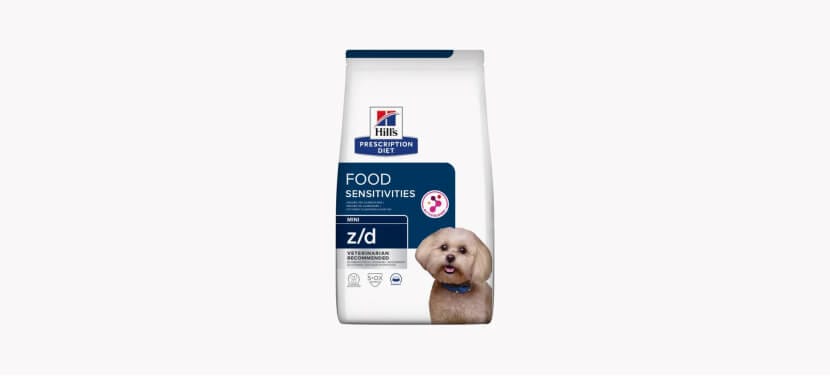Hill’s Prescription Diet Z/D Canine Dog Food Review (Dry)

DogFoodAdvisor is reader supported See how
All reviews are 100% impartial but if you buy using links on this page, we may earn a referral fee.
Our Verdict
Hill’s Prescription Diet Z/D Canine Dog Food is not rated due to its intentional therapeutic design.
The Hill’s Prescription Diet Z/D Canine product line includes the two dry dog foods listed below. Each is designed to help with the support of pets with skin or food sensitivities.
Each recipe includes its AAFCO nutrient profile: Growth (puppy), Maintenance (adult), All Life Stages, Supplemental or Unspecified.
| Product line | Rating | AAFCO |
|---|---|---|
| Hill's Prescription Diet Z/D Canine Original Flavor | Not rated | M |
| Hill's Prescription Diet Z/D Canine Small Bites | Not rated | M |
Recipe and Label Analysis
Hill’s Prescription Diet Z/D Canine Original Flavor was selected to represent both products in the line for detailed recipe and nutrient analysis.
Hill's Prescription Diet Z/D Canine Original Flavor
Estimated Dry Matter Nutrient Content
Protein
Fat
CarbsCarbohydrates
Corn starch, hydrolyzed chicken liver, hydrolyzed chicken, powdered cellulose, soybean oil, calcium carbonate, dicalcium phosphate, lactic acid, potassium chloride, glyceryl monostearate, choline chloride, iodized salt, vitamins (vitamin E supplement, l-ascorbyl-2-polyphosphate (source of vitamin C), niacin supplement, thiamine mononitrate, vitamin A supplement, calcium pantothenate, biotin, vitamin B12 supplement, pyridoxine hydrochloride, riboflavin supplement, folic acid, vitamin D3 supplement), dl-methionine, magnesium oxide, minerals (ferrous sulfate, zinc oxide, copper sulfate, manganous oxide, calcium iodate, sodium selenite), taurine, mixed tocopherols for freshness, natural flavors, beta-carotene
Fiber (estimated dry matter content) = 4.7%
Red denotes any controversial items
| Estimated Nutrient Content | |||
|---|---|---|---|
| Method | Protein | Fat | Carbs |
| Guaranteed Analysis | 20% | 14% | NA |
| Dry Matter Basis | 20% | 14% | 58% |
| Calorie Weighted Basis | 18% | 31% | 51% |
Ingredients Analysis
The first ingredient in this dog food is corn starch, a starchy powder extracted from the endosperm found at the heart of a kernel of corn. Corn starch is most likely used here to thicken the broth into a gravy.
Corn starch isn’t a true red flag item. Yet we’ve highlighted here for those wishing to avoid corn-based ingredients.
The next two ingredients are hydrolyzed chicken liver and hydrolyzed chicken, organ and muscle meat that have been chemically broken-down into their component amino acids. Hydrolyzed proteins are considered hypoallergenic.
The fourth ingredient is powdered cellulose, a non-digestible plant fiber usually made from the by-products of vegetable processing. Except for the usual benefits of fiber, powdered cellulose provides no nutritional value to a dog.
The fifth ingredient is soybean oil. Soybean oil is red flagged here only due to its rumored (yet unlikely) link to canine food allergies.
However, since soybean oil is high in omega-6 fatty acids and contains no omega-3’s, it’s considered less nutritious than flaxseed oil or a named animal fat.
The sixth ingredient is calcium carbonate, likely used here as a dietary mineral supplement.
The seventh ingredient is dicalcium phosphate, likely used here as a dietary calcium supplement.
From here, the list goes on to include a number of other items.
But to be realistic, ingredients located this far down the list (other than nutritional supplements) are not likely to affect the overall rating of this Hill’s product.
With 4 notable exceptions…
First, we find no mention of probiotics, friendly bacteria applied to the surface of the kibble after processing to help with digestion.
Next, this recipe contains sodium selenite, a controversial form of the mineral selenium. Sodium selenite appears to be nutritionally inferior to the more natural source of selenium found in selenium yeast.
In addition, we note the use of taurine, an important amino acid associated with the healthy function of heart muscle. Although taurine is not typically considered essential in canines, some dogs have been shown to be deficient in this critical nutrient.
And lastly, the minerals listed here do not appear to be chelated. And that can make them more difficult to absorb. Chelated minerals are usually associated with higher quality dog foods.
Nutrient Analysis
Although this is a prescription product, our review has nothing to do with the accuracy of claims made by the manufacturer as to the product’s ability to treat or cure a specific health condition.
So, to find out whether or not this dog food is appropriate for your particular pet, you must consult your veterinarian.
With that understanding…
Based on its ingredients alone, Hill’s Prescription Diet Z/D Canine looks like an average dry dog food.
The dashboard displays a dry matter protein reading of 20%, a fat level of 14% and estimated carbohydrates of about 58%.
As a group, the brand features an average protein content of 20% and a mean fat level of 15%. Together, these figures suggest a carbohydrate content of 58% for the overall product line.
And a fat-to-protein ratio of about 73%.
Below-average protein. Near-average fat. And above-average carbs when compared to a typical dry dog food.
Free of any plant-based protein boosters, this looks like the profile of a kibble containing a limited amount of meat.
Hill's Dog Food Recall History
The following automated list (if present) includes all dog food recalls related to Hill's through July 2024.
No recalls noted.
You can view a complete list of all dog food recalls since 2009 here.
Our Rating of Hill's Grain-Inclusive Dog Food
Hill’s Prescription Diet Z/D Canine is a grain-inclusive dry dog food using a limited amount of hydrolyzed chicken liver as its main source of animal protein.
However, due to its intentional therapeutic design, this dog food is not rated.
Compare Hill's Dog Food
How does Hill's compare with The Dog Food Advisor's most recommended brands?
A Final Word
The Dog Food Advisor does not accept money, gifts, samples or other incentives in exchange for special consideration in preparing our reviews.
However, we do receive a referral fee from online retailers (like Chewy or Amazon) and from sellers of perishable pet food when readers click over to their websites from ours. This helps cover the cost of operation of our free blog. Thanks for your support.
For more information, please visit our Disclaimer and Disclosure page.




